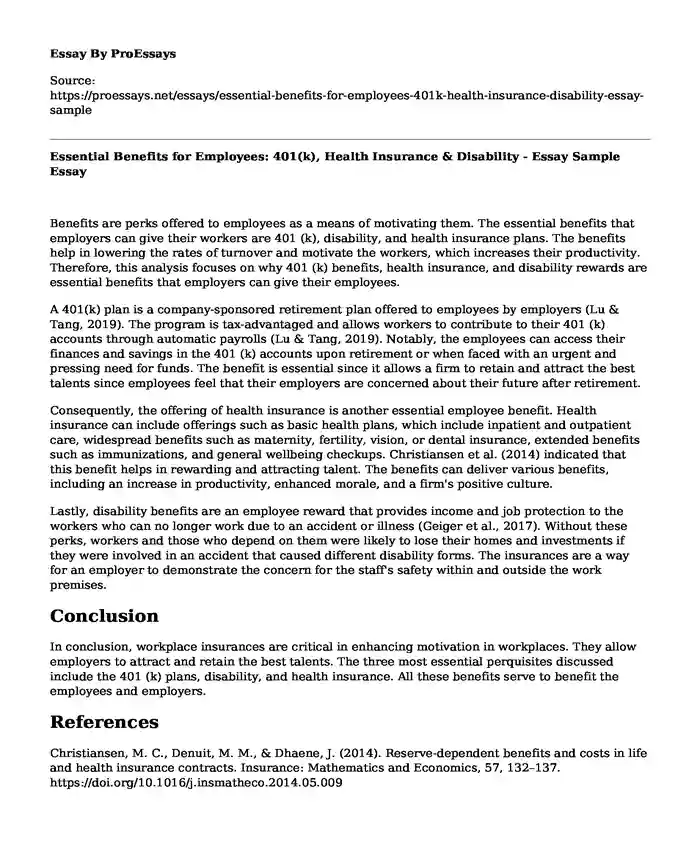Benefits are perks offered to employees as a means of motivating them. The essential benefits that employers can give their workers are 401 (k), disability, and health insurance plans. The benefits help in lowering the rates of turnover and motivate the workers, which increases their productivity. Therefore, this analysis focuses on why 401 (k) benefits, health insurance, and disability rewards are essential benefits that employers can give their employees.
A 401(k) plan is a company-sponsored retirement plan offered to employees by employers (Lu & Tang, 2019). The program is tax-advantaged and allows workers to contribute to their 401 (k) accounts through automatic payrolls (Lu & Tang, 2019). Notably, the employees can access their finances and savings in the 401 (k) accounts upon retirement or when faced with an urgent and pressing need for funds. The benefit is essential since it allows a firm to retain and attract the best talents since employees feel that their employers are concerned about their future after retirement.
Consequently, the offering of health insurance is another essential employee benefit. Health insurance can include offerings such as basic health plans, which include inpatient and outpatient care, widespread benefits such as maternity, fertility, vision, or dental insurance, extended benefits such as immunizations, and general wellbeing checkups. Christiansen et al. (2014) indicated that this benefit helps in rewarding and attracting talent. The benefits can deliver various benefits, including an increase in productivity, enhanced morale, and a firm's positive culture.
Lastly, disability benefits are an employee reward that provides income and job protection to the workers who can no longer work due to an accident or illness (Geiger et al., 2017). Without these perks, workers and those who depend on them were likely to lose their homes and investments if they were involved in an accident that caused different disability forms. The insurances are a way for an employer to demonstrate the concern for the staff's safety within and outside the work premises.
Conclusion
In conclusion, workplace insurances are critical in enhancing motivation in workplaces. They allow employers to attract and retain the best talents. The three most essential perquisites discussed include the 401 (k) plans, disability, and health insurance. All these benefits serve to benefit the employees and employers.
References
Christiansen, M. C., Denuit, M. M., & Dhaene, J. (2014). Reserve-dependent benefits and costs in life and health insurance contracts. Insurance: Mathematics and Economics, 57, 132–137. https://doi.org/10.1016/j.insmatheco.2014.05.009
Geiger, B. B., Garthwaite, K., Warren, J., & Bambra, C. (2017). Assessing work disability for social security benefits: International models for the direct assessment of work capacity. Disability and Rehabilitation, 40(24), 2962–2970. https://doi.org/10.1080/09638288.2017.1366556
Lu, T., & Tang, N. (2019). Social interactions in asset allocation decisions: Evidence from 401(k) pension plan investors. Journal of Economic Behavior & Organization, 159, 1–14. https://doi.org/10.1016/j.jebo.2019.01.009
Cite this page
Essential Benefits for Employees: 401(k), Health Insurance & Disability - Essay Sample. (2023, Oct 26). Retrieved from https://proessays.net/essays/essential-benefits-for-employees-401k-health-insurance-disability-essay-sample
If you are the original author of this essay and no longer wish to have it published on the ProEssays website, please click below to request its removal:
- Paper Example on Labor Outsourcing
- To Eat Meat or Not Essay Example
- Essay Sample on Motor Neuron Disorders
- A Summary of IOM's Report and its Significance to Nursing - Essay Sample
- Essay on Walter Jordan: Negligence of Arizona Department of Correction Led to Skin Cancer Death
- Fuel Your Lacrosse Performance With Proper Nutrition - Essay Sample
- Paper Example on CHRO Establishes Strategic Recruitment Plan for Expansion







